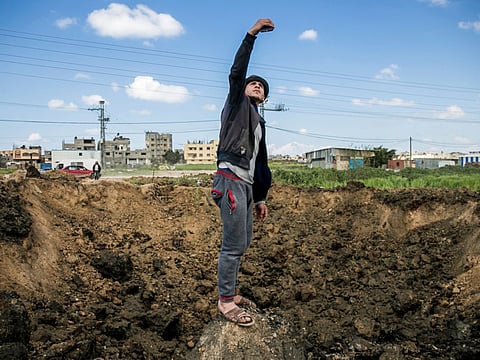Gaza rocket salvo sparks fear of new Israeli assault
Hamas is desperately trying to thwart escalation as it finds itself in a very weak position to fight a new war

Ramallah: A recent escalation in rocket attacks between Gaza-based fighters and Israel has Palestinians worried of a possible new Israeli assault on the already-devastated territory.
Three years after the most recent war in 2014, the humanitarian situation in Gaza is grim; poverty and unemployment levels are rising, 95 per cent of Gaza’s water is undrinkable, borders with Israel and Egypt are largely closed, Palestinians in Gaza are not granted permission to work in 1948 areas, electricity cuts persists and reconciliation between Hamas and Fatah remains elusive.
“This catastrophic situation is untenable. Unless there is a long-term truce, another war is sure to erupt,” Gaza-based political analyst Mukhaimer Abu Sa’ada tells Gulf News.
Israeli defence minister, Avigdor Lieberman, is also acting tough to prove Israel’s deterrence capability. Israeli Prime Minister Benjamin Netanyahu has threatened to dismantle his government and call for snap polls, partly to deflect attention on a massive corruption probe launched against him.
Lieberman hopes to protect his position if new elections are called by showing his firm hand on Gaza.
As far as Israel’s capabilities are concerned, it has received equipment with advanced technology capable of detecting tunnels, putting it at an even-more superior advantage than Hamas, which rules the territory.
At least 2,104 Palestinians were killed in Israel’s 2014 assault on Gaza, the vast majority of which were civilians.
At least 495 children and 253 women were killed, while 11,231 were injured and 18,000 homes were destroyed, according to UN figures.
Since then, Egypt and Israel, both of which impose a crippling siege on Gaza have been working to destroy tunnels which Hamas uses to smuggle weapons, but also in vital food, medicine supplies and other goods and products for businesses to energise Gaza’s stagnant economy.
Hamas was able to impose taxes on goods coming in and out of the tunnels, but after it lost this important source of revenue, it has moved to tax Gaza’s businessmen, which has led to growing frustration and resentment from the population.
With Hamas’ weakened popularity it is not in a strong position in the case of a new war.
“Hamas does not want war currently, because it is in a transitional period, with elections for its leadership undergoing until April,” Ahmad Ganem, a political expert tells Gulf News.
In fact, Hamas isn’t behind the recent rocket attacks into Israel — it is the Salafists.
Observers believe Hamas uses the Salafists who fire rockets as a way to be able to show that resistance continues while it is not directly blamed for their actions — they can also easily control them.
“Hamas does not allow the Salfists to possess enough quantity of rockets that could disrupt the balance,” Ganem said.
A western diplomat speaking to Gulf News on the condition of anonymity says that there is a “calculated escalation on both sides” but doesn’t think either side for now will escalate further.
“At the moment neither side has crossed the red line,” the diplomat said.
Egyptian security officials have boosted pressure on Hamas to control the Salafists, who are active in Egypt’s Sinai Peninsula.
Hamas leader Esmail Haniya and its internal security chief, Tawfiq Abu Naeim, were recently called to Cairo to discuss the matter — lending to its urgency.
The Salafists also could be using the rocket attacks to act out against the Hamas crackdown against them by flexing their muscles.
There is no figure for the number of Salafists operating in Gaza, but Hamas has jailed around 500 of its members.
The Jabaliya and Rafah neighbourhoods are considered Salafist strongholds.
Hamas is aware of the new political climate in Washington, with the very pro-Israel presidency of Donald Trump and is acting very carefully in order to avoid a military escalation.
Any potential Israel offensive would enjoy unprecedented US backing, Abu Sa’ada believes.
But, he is confident that nothing will happen at the moment.
The Trump administration is hoping to push a regional peace package at the upcoming Arab Summit in Jordan next week which Trump has touted as “the ultimate deal” although no details have emerged on what the package could entail.
Israel, on the other hand, has no clear strategy towards Gaza, Abu Sa’ada says.
“Its three wars on Gaza have achieved nothing. It has no interest in toppling Hamas in the absence of an alternative power in Gaza,” he said.
“For now Israel just wants Hamas to crackdown on Salafist rockets, but if any Israeli is killed in a rocket attack, Hamas will be dragged into a war it does not want.”
— Mohammed Najib is a freelance journalist based in Ramallah
Sign up for the Daily Briefing
Get the latest news and updates straight to your inbox



